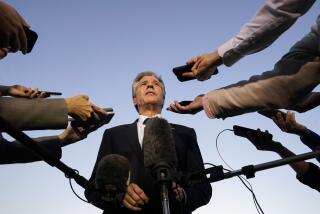Egypt Urges a Review of Iraq Sanctions Policy
- Share via
CAIRO — In a sharp rebuke to U.S. policy on Iraq, a senior Egyptian official bluntly told Secretary of State Colin L. Powell on Saturday that Iraq is no longer a threat to the region and that the time has come to reconsider the decade-old embargo on Baghdad.
“Sanctions should be reconsidered as a weapon or as one of the procedures that the [U.N.] Security Council resorts to,” Foreign Minister Amr Moussa said at a joint news conference after Powell held talks with Moussa and President Hosni Mubarak.
“Sanctions so far have affected the people rather than any regime. This situation should be under constant review so it’s not a stagnant situation,” he added.
The policy shift from one of America’s closest allies--a pivotal member of the 38-nation coalition that defeated Iraq in the 1991 Persian Gulf War--was an embarrassing blow on the first leg of Powell’s debut abroad as secretary of State, a whirlwind swing through six Mideast stops and Brussels.
Powell arrived in Egypt on Saturday to be greeted by scathing editorials in the Egyptian press challenging U.S. motives in sustaining the world’s toughest economic embargo.
“After the destructive Gulf War and 10 years of blockade, Iraq no longer threatens anyone. . . . Tell Powell that we do not want to participate in starving the Iraqi people under the claim of fears for Kuwait, Saudi Arabia or other Iraqi neighbors,” wrote the pro-government weekly Akhbar el Yom. “The U.S. wants to maintain [President Saddam Hussein’s] regime as the boogeyman for the Gulf countries so as to maintain its troops in the Gulf to protect and secure the inflow of oil.”
U.S. officials traveling with Powell tried to downplay the differences. During their private talks, Mubarak agreed with Powell on the fundamental goal of preventing Iraq from developing weapons of mass destruction or rebuilding its military, the officials said.
En route to the Mideast, Powell told reporters on his plane that the United States needs “to turn the debate onto [Hussein’s] actions as opposed to our actions.”
But the criticism of U.S. policy by a country that accounts for more than half the world’s Arab population reflected mounting opposition that the Bush administration is finding difficult to counter. Throughout the region, Arab communities Saturday staged anti-American protests.
In two West Bank towns, hundreds of Palestinians attending pro-Iraqi demonstrations chanted “Powell, go home!” and burned pictures of Powell and President Bush as well as the American flag. The volatile security situation led the United States to shift the site for Powell’s scheduled meeting today with Palestinian Authority President Yasser Arafat.
In Jordan, which Powell also planned to visit today, more than 500 people carrying portraits of the Iraqi leader protested the secretary’s impending arrival and denounced him as a war criminal and a coward.
“Lift the sanctions on Iraq now and stop the war and destruction,” proclaimed one banner.
In Cairo, Powell also found himself on the defensive about the U.S. and British airstrikes near Baghdad earlier this month in response to Iraqi antiaircraft attacks on allied warplanes as they flew over the two “no-fly” zones in Iraq.
“These zones have a purpose--to protect people, protect Arabs, not to affect anything else in the region. And we have to defend ourselves,” Powell said.
The secretary, in office only five weeks, said the reaction had “sensitized” the Bush administration to the need to “do a better job of making our friends aware of the kinds of plans we are executing and the kinds of contingency plans we have.”
The Iraq issue will continue to be debated between the long-standing allies. Powell announced that Mubarak had accepted an invitation to visit Washington on April 2 “to further cement our strong relationship.”
More to Read
Sign up for Essential California
The most important California stories and recommendations in your inbox every morning.
You may occasionally receive promotional content from the Los Angeles Times.













